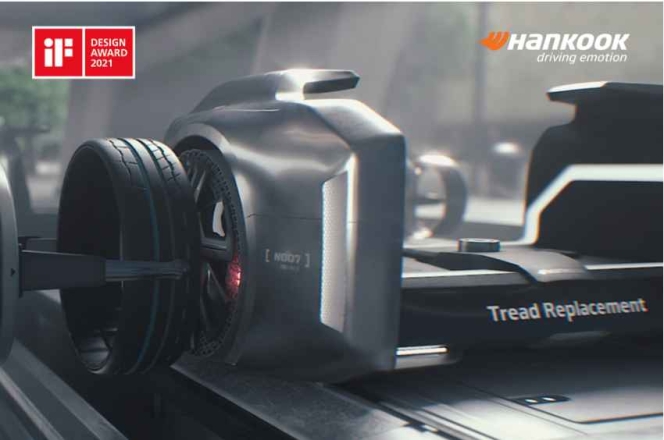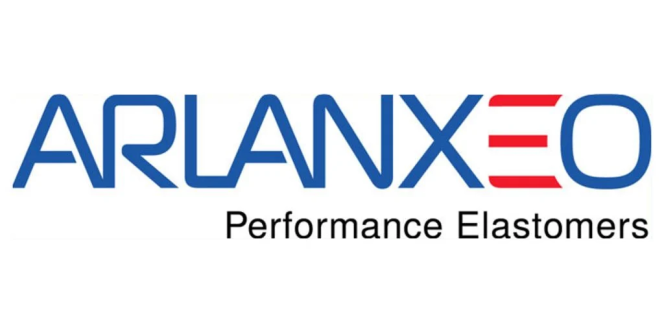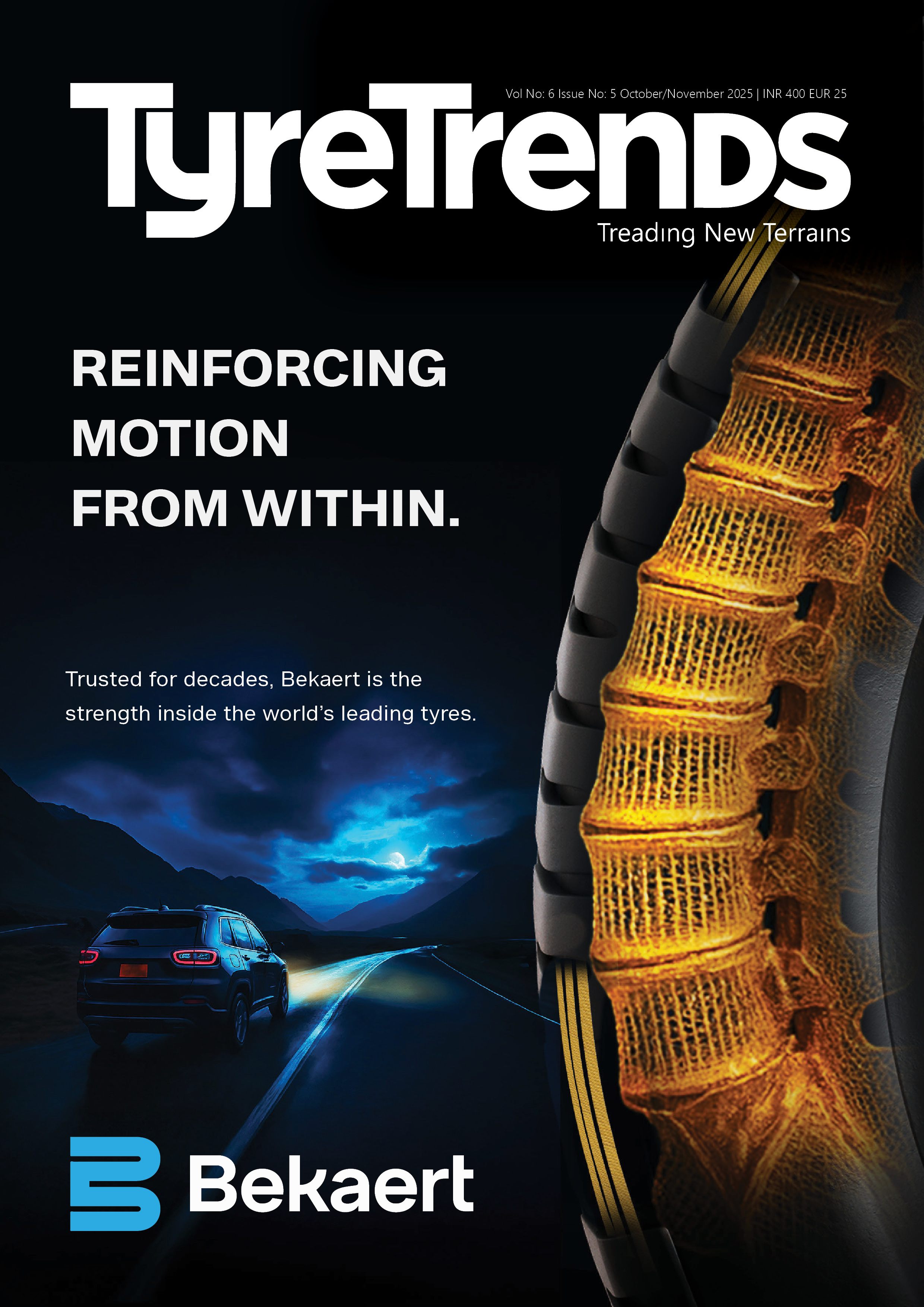Hankook Tire Bags the iF Design Award 2021 in Two Categories
- By TT News
- April 20, 2021

Hankook Tire has won in the Professional Concept and Communication categories at the iF Design Award 2021 for its Design Innovation Project 2020.
The Design Innovation is Hankook’s R&D project held every two years, in collaboration with one of the world’s leading design universities. For the project, Hankook has collaborated with professors and students from the Department of Industrial Design at the University of Cincinnati in the U.S.
The project visualised the transformation of cities geared by mobility under the theme of ‘Urban Reshaping’. It showcased mobility as part of living spaces rather than a stand-alone vehicle in the future where augmented automation infrastructure and technologies such as eco-friendly technology, autonomous driving and Artificial Intelligence (AI) are to be adopted.
In the Professional Concept category, a platform which Hankook proposed and named as ‘Hankook Platform System (HPS)-Cell’ took the winning place. In particular, it received high scores in the Form criterion which evaluates aesthetics and execution as well as in the differentiation criterion which evaluates individuality and intrinsic value.
The tyre of HPS-Cell is an airless tyre featuring a unit-cell structure. It is a concept tyre that uses sensor technology to not only identify tyre treads and road conditions in real-time but also to respond to wear-out risks and change tread patterns according to the road condition utilizing variable wheels and optimized infrastructure.
Not just this but the Design Innovation Film 2020, the concept film that had been produced to bring the conceptual tire and HPS-Cell platform to life, won the award in the Communication category. The film illustrates how this kind of mobility platform could be utilised. It was evaluated highly in the Impact criterion which evaluates sustainability and social contribution.
Jimmy Kwon, Vice President of Hankook Tire Brand Lab, said, “It’s an honour to receive global recognition for our innovative design philosophy and capabilities. This recognition demonstrates our design leadership in the industry as well as our vision for future mobility. By incorporating new ideas with our cutting-edge technology, we are continuously exploring design concepts for the next generation and strengthening our premium brand asset.” (TT)
- Bridgestone India
- Bridgestone Mobility Social Impact Awards 2025
- Jeya Padmanaban
- Safety Research Foundation
- Hiroshi Yoshizane
Bridgestone Honours Social Impact Innovators At 5th Edition Of Mobility Social Impact Awards 2025
- By TT News
- October 16, 2025
Bridgestone India announced the winners of the 5th Edition of its Mobility Social Impact Awards (MSIA) 2025 in Pune, celebrating organisations that use mobility for social good.
The top honour in the Road Safety Innovation and Excellence category went to ALERT (Amenity Lifeline Emergency Response Team) from Chennai for empowering over 450,000 citizens with emergency response skills. Safety Research Foundation (SRF), based in Pune, received a Jury Commendation for its BRACE Project, which transforms school zones with safety audits and infrastructure upgrades.
In the Empowerment of Vulnerable Communities category, The Association of People with Disability (APD), Bengaluru, won the top honour for its Rehab on Wheels initiative, which provides last-mile rehabilitation services.
The winners were presented with their awards by social worker Dr. Girish Kulkarni, founder of Snehalaya.
Hiroshi Yoshizane, Group President, Bridgestone Asia Pacific and Managing Director, Bridgestone India, said: “It is a privilege to honour these changemakers who are redefining mobility for social good. Their work reflects our shared commitment to building inclusive, safe, and empowered communities.”
Jeya Padmanaban, Founding Trustee, Safety Research Foundation (SRF), said, “We are truly honoured to receive the Jury Commendation at the Bridgestone Mobility Social Impact Awards 2025. The BRACE Project reflects our belief that road safety must begin at the community level, where awareness and infrastructure meet action. This recognition strengthens our resolve to continue building safer environments for children and fostering a culture of responsibility and care on our roads.”
| Category | Winner / Commendation | Organisation (Location) | Initiative Focus |
| Road Safety Innovation and Excellence | Winner | ALERT (Chennai) | Empowering citizens with emergency response skills |
| 1st Runner-up | SAFE India (Bhubaneshwar) | Improving safety through #ZoneZero Safe School Zone and Driver Training programs | |
| Jury Commendation | Safety Research Foundation (SRF) (Pune) | Transforming school zones via the BRACE Project | |
| Empowerment of Vulnerable Communities | Winner | The Association of People with Disability (APD) (Bengaluru) | Providing last-mile rehabilitation services via Rehab on Wheels |
| 1st Runner-up | Impact Guru Foundation (IGF-India) (Delhi) | Initiatives like Empower Her and Mission I-M-Possible, focusing on healthcare, education, and skilling | |
| Jury Commendation | Jharkhand Vikas Parishad (JVP) (Jharkhand) | Community-led programs promoting sustainable livelihoods and women’s empowerment |
Alessio Iacovelli Named Deputy Director Replacement Sales West Europe At Linglong Tire
- By TT News
- October 10, 2025

Linglong Tire has announced the promotion of Alessio Iacovelli to Deputy Director of Replacement Sales for Western Europe, effective 1 September 2025. In this elevated role, Iacovelli will take on leadership of the regional sales team with a mandate to accelerate business development. His key objectives will include forging strategic alliances and implementing programmes to strengthen customer loyalty. Iacovelli will report directly to Lisa Zhao, the Director of Replacement Sales for Western Europe, and will collaborate with her to manage key markets, including Germany, the UK, Italy and Spain.
Iacovelli, who began his career with Goodyear and Nexen, first joined Linglong Tire at the end of 2022 as a Sales Manager. In that capacity, he demonstrated significant success in developing the Southern European aftermarket, where he expanded the brand's footprint, defined effective growth strategies and secured robust partnerships with distributors. This strategic appointment and the restructuring of the sales leadership underscore Linglong Tire's intensified focus on achieving its ambitious growth targets across the European continent.
Iacovelli said, "I am very pleased to have been promoted to Deputy Director Replacement Sales West Europe at Linglong Tire. We have fantastic products such as the Sport Master 4S and the Sport Master Winter, both successfully tested in the recently published tyre tests. We have a state-of-the-art development centre in Germany and a new tyre plant in Europe and are successful in original equipment – ideal conditions for achieving our ambitious goals together with my team and the colleagues in Hannover and continuing to grow, especially in Europe."
ARLANXEO To Close French Plant As Chemicals Sector Struggles
- By TT News
- October 10, 2025

German synthetic rubber maker ARLANXEO has launched consultations with worker representatives over the potential closure of its Port Jerome facility in France, citing persistent weak demand and declining competitiveness in the European chemicals industry.
The company, which is majority-owned by Saudi Aramco, had begun an information and consultation period with the Works Council at the site, located in northern France. A final decision on the closure will be taken after the mandatory consultation process concludes and approval is obtained from the French labour authorities, DREETS.
“The European chemical industry continues to face persistent weak demand and declining competitiveness driven by rising costs, unbalanced global markets, and increased regulatory pressure,” said Stephan van Santbrink, ARLANXEO chief executive.
“These conditions have generated a significant burden on the sector across the regional value chain. ARLANXEO has not been an exception to these challenges. The Port Jerome site has remained in a structurally loss-making position. Despite numerous improvement efforts, we do not foresee a viable path to a sustained structural improvement.”
The company did not disclose how many jobs would be affected by a potential closure, nor did it provide details on the facility’s production capacity or annual output.
Van Santbrink acknowledged the impact on workers, saying: “We recognise the impact a potential closure may have on our employees, and we regret the need to consider these steps. We will continue to treat all employees with respect. If we decide to cease operations at the site, we will do our utmost to assist in finding alternative solutions for all impacted employees. In addition, we intend to provide impacted employees with a social plan which reflects their valued contribution to ARLANXEO.”
The announcement adds to a growing list of European chemical producers struggling with high energy costs, sluggish demand and competition from lower-cost producers in Asia and the United States.
ARLANXEO said it would work closely with all affected internal and external stakeholders to minimise the impact of the intended closure.
Continental Appoints Managers For Global Purchasing And Original Equipment Business
- By TT News
- October 07, 2025

Continental's Tires group sector has strengthened its leadership team with two key internal appointments, effective 1 September 2025. Jana Striezel has been named the new head of global purchasing for Continental Tires, while Dennis Bellmund has assumed leadership of the global original equipment business for both passenger and commercial vehicles. Both executives will report directly to Christian Kötz, the member of Continental AG's Executive Board who leads the Tires group sector.
In her new capacity, Striezel will oversee worldwide strategic and operational purchasing. She brings extensive experience from the automotive industry, having previously held several procurement management roles at Renault, where she led purchasing for the Renault brand and its alliance with Nissan and Mitsubishi in Europe. Her career began at Volkswagen in 2014.

Bellmund, who has a 25-year tenure with Continental, steps into his role following the departure of his predecessor, Manja Greimeier, to the ContiTech sector. His extensive background within the company includes recent responsibility for Continental’s tyre retail operations, alongside prior leadership roles in EMEA supply chain management and sales direction for the European replacement tyre business. These appointments signal a strategic reinforcement of Continental's tyre division leadership.
Kötz said, “We’re delighted to welcome Jana Striezel, a highly skilled manager, to our team. She brings extensive expertise in international procurement and will focus on driving forward our purchasing strategy. In Dennis Bellmund, our global original equipment business has gained a highly experienced leader. Thanks to his many years at Continental, he is familiar with our company and our customers’ needs from many different angles. On behalf of the entire management team, I wish both of them every success in their new roles and look forward to working together.”
“On behalf of the entire team, I would like to thank Manja Greimeier for her successful leadership of our original equipment business and wish her all the best and continued success,” added Kötz.






Comments (0)
ADD COMMENT